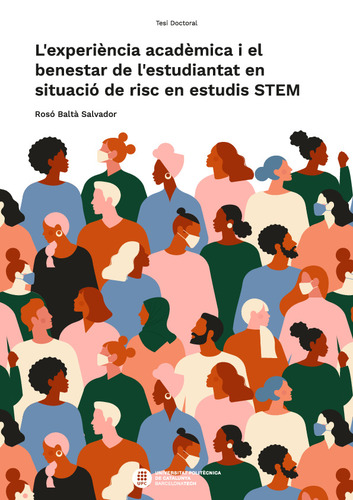L'experiència acadèmica i el benestar de l'estudiantat en situació de risc en estudis STEM

Visualitza/Obre
10.5821/dissertation-2117-371803
Inclou dades d'ús des de 2022
Cita com:
hdl:2117/371803
Càtedra / Departament / Institut
Universitat Politècnica de Catalunya. Institut Universitari de Recerca en Ciència i Tecnologies de la Sostenibilitat
Tipus de documentTesi
Data de defensa2022-06-29
EditorUniversitat Politècnica de Catalunya
Condicions d'accésAccés obert
Tots els drets reservats. Aquesta obra està protegida pels drets de propietat intel·lectual i
industrial corresponents. Sense perjudici de les exempcions legals existents, queda prohibida la seva
reproducció, distribució, comunicació pública o transformació sense l'autorització del titular dels drets
Abstract
One of the main goals of the 2030 Agenda for sustainable development is to guarantee quality education for all students, especially the most vulnerable. Engineering studies are a key element in educating and training future generations in the design and development of innovative solutions that contribute to the achievement of the Sustainable Development Goals (SDGs). However, some situations may prevent the provision of quality education for all students. This research explores two of them: (1) students who are part of minority groups, specifically foreign-born students, and (2) learning during an emergency situation. As previous literature has shown, these are two threatening contexts involving multiple factors that can have a negative impact on students, affecting their performance and academic persistence. This thesis aims to provide a better understanding of the factors that intervene in engineering students' educational experience and well-being when they find themselves in these situations to determine how the elements studied can compromise their development and prevent them from benefiting from an equitable and quality education. The research is based on three analytical-descriptive studies, two of them using cross-sectional surveys and one of them using a longitudinal survey. The questionnaires were distributed to undergraduate engineering students at the Universitat Politècnica de Catalunya · BarcelonaTech (UPC). From the data collected, descriptive and inferential statistical methods were used to perform the analysis. The results showed that the risk situations analyzed do indeed have an impact on the well-being and academic experience of the students. Among other detrimental effects, it is worth highlighting the decrease in psychological well-being, such as in students' self-esteem and the feelings of worry, discouragement, discomfort, and vigilance. The situations analyzed also have a significant impact on their learning and academic development, to the point of leading students to drop out of their studies. To address the risks to which students are exposed and mitigate their negative affect, this thesis identifies good practices and recommendations that will help academic institutions develop appropriate support systems. Un dels objectius fonamentals que planteja l’Agenda 2030 per al desenvolupament sostenible és el de garantir una educació de qualitat per a tots els i les estudiants, especialment aquells i aquelles més vulnerables. Els estudis d’enginyeria són una peça clau per tal de formar i capacitar les futures generacions en el disseny i desenvolupament de solucions innovadores que contribueixin a l’assoliment dels Objectius de Desenvolupament Sostenible (ODS). Tanmateix, hi ha situacions que poden impedir que es proporcioni una educació de qualitat per a tot l’alumnat. En aquesta recerca s’exploren dues d’elles: (1) els grups minoritaris, concretament l’estudiant nascut a l’estranger, i (2) l’ensenyament durant una situació d’emergència. Tal com exposa la literatura prèvia, es tracta de dos contextos d’amenaça en els que intervenen múltiples factors que poden tenir un impacte negatiu en l’alumnat, arribant a afectar el seu rendiment i persistència acadèmica. La present tesi té com a propòsit aportar una major comprensió dels factors que intervenen en l’experiència educativa i el benestar de l’estudiant d’enginyeria quan es troben en aquestes situacions per determinar com els elements estudiats poden comprometre el seu desenvolupament i impedir que es beneficiïn d’una educació equitativa i de qualitat. La investigació es desenvolupa a partir de tres estudis analític-descriptius, dos d’ells mitjançant l’ús d’enquestes transversals i un d’ells mitjançant una enquesta longitudinal. Els qüestionaris es van distribuir a estudiants de graus d’enginyeria de la Universitat Politècnica de Catalunya · BarcelonaTech (UPC). A partir de les dades recollides, es van utilitzar mètodes d’estadística descriptiva i inferencial per a realitzar l’anàlisi. Els resultats van mostrar que efectivament les situacions de risc analitzades tenen un impacte en el benestar i l’experiència acadèmica de l’estudiant. Entre altres efectes perjudicials, cal destacar la disminució del benestar psicològic, com per exemple en l’autoestima de l’alumnat i en els sentiments de preocupació, desànim, molèstia i vigilància. Les situacions analitzades també tenen un impacte significatiu en el seu aprenentatge i desenvolupament acadèmic, fins al punt de promoure que els i les estudiants abandonin els estudis. Per fer front als riscos als quals s’exposa l’alumnat i mitigar-ne els efectes negatius, aquesta tesi identifica bones pràctiques i recomanacions que ajudaran a les institucions acadèmiques a desenvolupar sistemes de suport adients.
Descripció
Tesi en modalitat de compendi de publicacions
CitacióBaltà Salvador, R. L'experiència acadèmica i el benestar de l'estudiantat en situació de risc en estudis STEM. Tesi doctoral, UPC, Institut Universitari de Recerca en Ciència i Tecnologies de la Sostenibilitat, 2022. DOI 10.5821/dissertation-2117-371803. Disponible a: <http://hdl.handle.net/2117/371803>
Col·leccions
| Fitxers | Descripció | Mida | Format | Visualitza |
|---|---|---|---|---|
| TRBS1de1.pdf | 5,850Mb | Visualitza/Obre |

